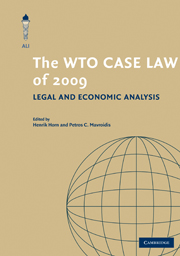Book contents
- Frontmatter
- Contents
- Foreword
- Introduction
- US Compliance with WTO Rulings on Zeroing in Anti-Dumping
- United States – Continued Existence and Application of Zeroing Methodology: the end of Zeroing?
- Incomplete Harmonization Contracts in International Economic Law: Report of the Panel, China – Measures Affecting the Protection and Enforcement of Intellectual Property Rights, WT/DS362/R, adopted 20 March 2009
- Comment
- Trading Cultures: Appellate Body Report on China–Audiovisuals
- Comment
- ‘Optimal’ Retaliation in the WTO – a commentary on the Upland Cotton Arbitration
Introduction
Published online by Cambridge University Press: 05 December 2011
- Frontmatter
- Contents
- Foreword
- Introduction
- US Compliance with WTO Rulings on Zeroing in Anti-Dumping
- United States – Continued Existence and Application of Zeroing Methodology: the end of Zeroing?
- Incomplete Harmonization Contracts in International Economic Law: Report of the Panel, China – Measures Affecting the Protection and Enforcement of Intellectual Property Rights, WT/DS362/R, adopted 20 March 2009
- Comment
- Trading Cultures: Appellate Body Report on China–Audiovisuals
- Comment
- ‘Optimal’ Retaliation in the WTO – a commentary on the Upland Cotton Arbitration
Summary
This volume contains five reports on the World Trade Organization (WTO) case law of 2009, written in the context of the American Law Institute (ALI) project Legal and Economic Principles of World Trade Law, which aims to provide systematic analysis of WTO law based on both economics and law. Each report in the volume is written jointly by an economist and a lawyer, and each discusses a separate WTO dispute. The authors are free to choose the particular aspects of the dispute they wish to discuss. The aim is to determine for each dispute whether the Appellate Body's (or occasionally the Panel's) decision seems desirable from both an economic and a legal point of view, and, if not, whether the problem lies in the interpretation of the law or the law itself.
Earlier versions of the papers included in this volume were presented at a meeting in Geneva in June 2010, and we are very grateful for the comments at the meeting provided by Robert L. Howse and Frieder Roessler. We would also like to thank all of the other meeting participants for providing many helpful comments, and the WTO for providing a venue for the meeting.
Our sincere thanks also go to The American Law Institute, particularly to Director Lance Liebman, President Roberta Cooper Ramo, former President Michael Traynor, Deputy Director Stephanie Middleton, and former Deputy Director Elena Cappella, all of whom have been instrumental in bringing this project about.
- Type
- Chapter
- Information
- The WTO Case Law of 2009Legal and Economic Analysis, pp. 1 - 4Publisher: Cambridge University PressPrint publication year: 2011

